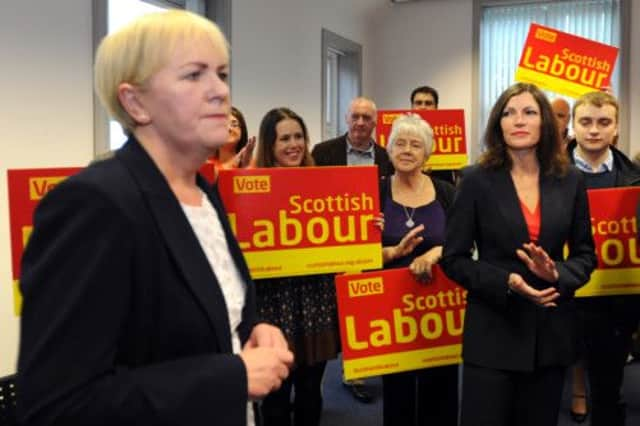Euan McColm: Lamont lets clear message become garbled


Johann Lamont said it was time for the First Minister to “take Scotland off pause” and prioritise running the country over the campaign for independence. Furthermore, this rejection of constitutional matters came as her party was reconnecting with the people of Scotland.
Understandably, Lamont luxuriated in what she described as an emphatic result. And there is some truth in what she said. By-elections may not necessarily tell us much about national results to come, but with the referendum now just 11 months away, the SNP hoped their stalled campaign would get a kick from a victory. Their narrative that the Yes campaign is building steady momentum could have done with some sort of hard evidence. Victory for Shirley Anne Somerville – taking six weeks out of what one might have thought to be her vital role as director of communities with Yes Scotland – would have made a strong exhibit to place in front of the court.
Advertisement
Hide AdAdvertisement
Hide AdBut while SNP defeat was something of a blow to the independence movement, Labour victory was not quite all Lamont cracked it up to be.
The Dunfermline seat was left vacant by the resignation of Bill Walker, the former SNP MSP currently serving a year in prison after being found guilty of assaulting three ex-wives and a stepdaughter. Walker was an accidental MSP, winning his seat by fewer than 600 votes in the nationalists’ remarkable 2011 election landslide.
Given both the narrowness of Walker’s election victory and the circumstances of his departure from the Scottish Parliament, the seven per cent swing that saw the party take the seat with a majority of 2,873 doesn’t seem all that impressive. The SNP’s vote was stronger in the by-election than it was in 2007, when Alex Salmond first took his party into government. Thursday’s result may be proof that Labour is moving in the right direction, but progress remains slow.
Let’s say, for a moment, that Lamont is correct in her assertion that Scots reject constitutional debate, preferring that the government deal with the here and now. If this is so, the Dunfermline by-election campaign has created what seems a significant difficulty for Lamont in any attempt to take the initiative in the debate over services.
In September of last year, the Scottish Labour leader delivered a speech in which she expounded the need for the country to examine the value of universal benefits. Lamont sought to paint herself and her party in contrast to the SNP, with its promises of council tax freezes, free prescriptions, and sundry other policies that left the nationalists open to the allegation their success was down to retail politics.
This was a risky but understandable strategy for Lamont to adopt. She could not compete with showman Salmond, so why not try to make her more down-to-earth nature a plus? Lamont’s speech was her pitch as the trustworthy, serious politician who would take difficult decisions about stretched public finances.
Lamont raised a serious issue. The council tax freeze is unquestionably popular, especially with the middle classes who can be trusted to turn out to vote, but by the 2016 Holyrood election it will have been in place for 10 years and nobody can make a plausible argument for why that must not mean a decline in the level and quality of services from local authorities.
So, Lamont was both brave (and not in the civil service definition of the word as “foolish”) and wise to try to seize the initiative in the debate over how we fund the services upon which we depend.
Advertisement
Hide AdAdvertisement
Hide AdDuring the by-election campaign, Labour issued a leaflet in which the party shouted its support for free prescriptions, free bus passes, the council tax freeze, and free personal care. At the same time, a vote for Labour in Dunfermline would be a vote in favour of the party’s pledge to increase free childcare across Scotland.
Lamont’s previous position on the affordability of free services – into which we must assume she and those around her put considerable thought – seems fatally undermined by Labour’s promise-the-earth approach in Fife.
In January, John Swinney’s draft budget will return to the Holyrood chamber. The Finance Secretary has been handed by Labour something of an advantage.
Shadow finance secretary Iain Gray has been left boxed in by his party’s surprising position on the services that were, until little more than a week ago, still very much up for difficult but necessary discussion.
It’s hard now to see how Labour might propose credible alternatives to the system as currently administered by the SNP when the party has committed itself to so many of the things for which it had criticised the nationalists.
Within the Labour Party, some are already questioning how Lamont gets around the problems created by the Dunfermline strategy. The implications have not gone unnoticed in Scottish Government ranks. A cabinet source summed things up briskly. Labour has left itself open to an accusation they’ve made against the SNP: that they will say anything to get elected.
With two-and-a-half years to go until the next Holyrood election, Labour is a way off having to produce a manifesto, but we might expect that there was at least some joined-up thinking going on around where the party should be directing its energies, and which issues – and which voters, distressingly cynical as that may sound – should receive priority. The contradictions between Lamont’s long stated position and the promises made by Labour in Dunfermline suggest that minds are far from focused.
Johann Lamont told us she believes that the by-election result sends a clear message to Alex Salmond about voter priorities. The problem for the opposition leader is that Labour’s strategy creates nothing but confusion over what she’d do in power. «
Twitter: @euanmccolm